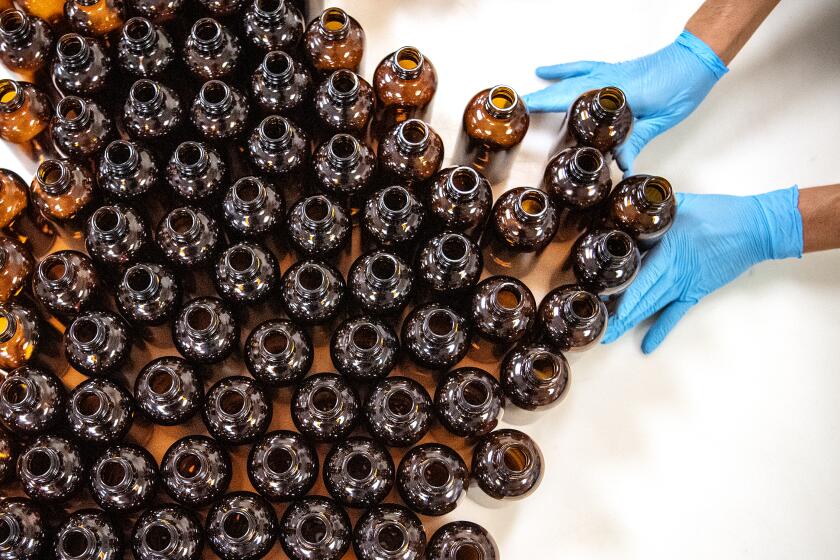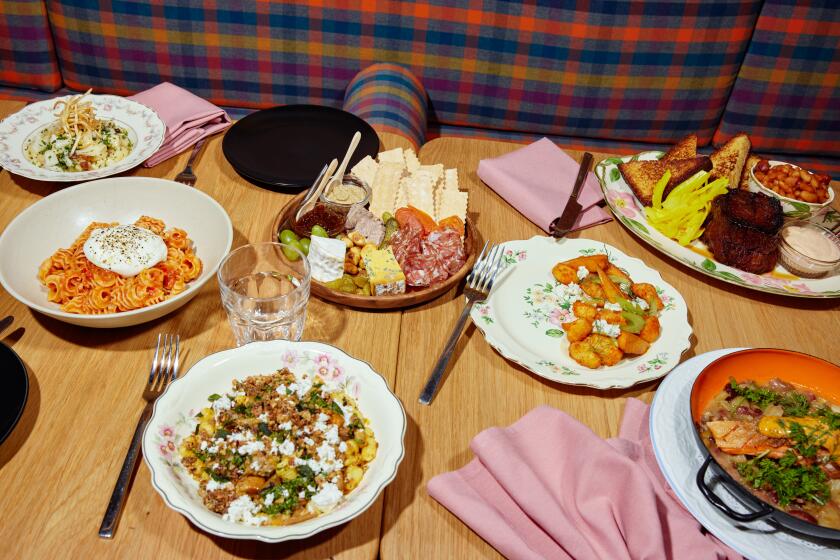Is your hot sauce hot stuff? This company can help you turn a side hustle into a business
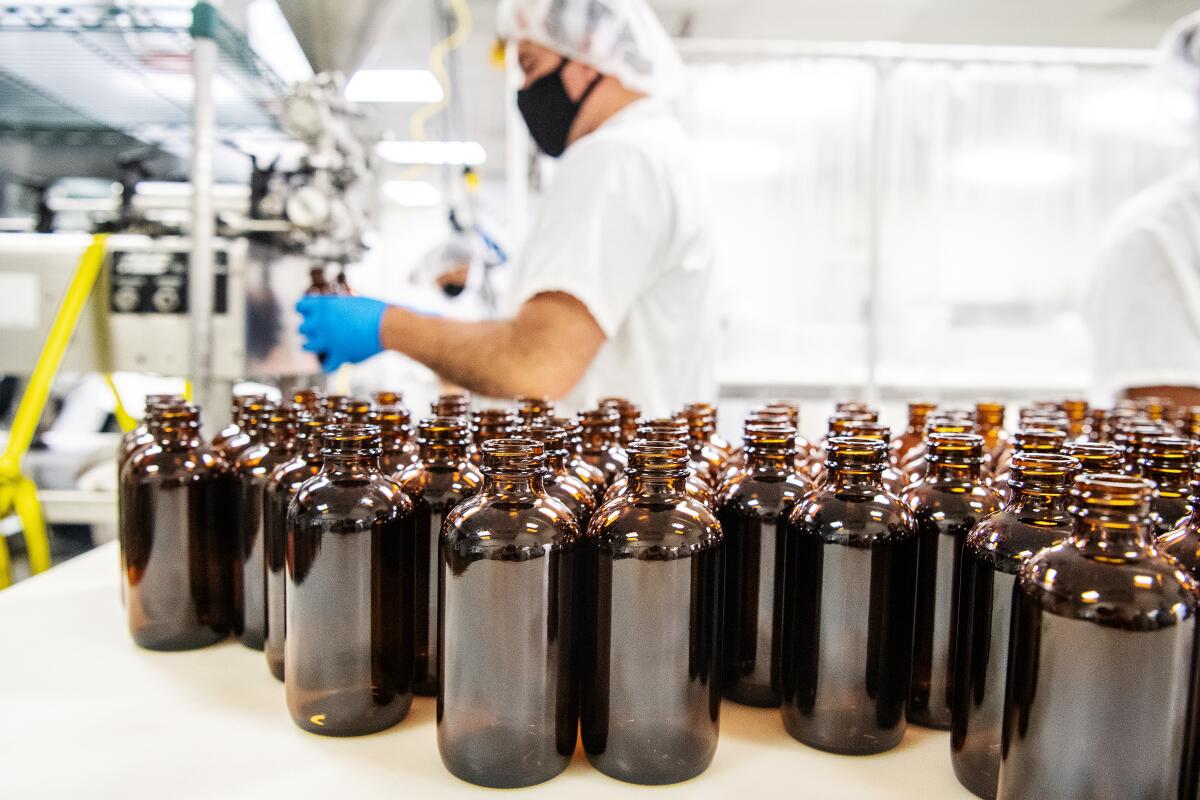
- Share via
For the last 15 months, Jenny Rosoff has started most of her mornings with one mission: helping home cooks and entrepreneurs pursue their culinary dreams.
In an industrial kitchen built for giants, dwarfed by 100-gallon pots and skillets larger than manhole covers, Rosoff and her staff of 30 at Village Green Foods in Irvine transform recipes into shelf-stable, mass-produced products.
Village Green Foods has been a behind-the-scenes force in Southern California for 30 years, manufacturing mass quantities of dressings, marinades, spreads and soups for large restaurant chains looking to make products ahead of time.
But as restaurants started to close during the pandemic and people were stuck at home, what was previously a small portion of the business — home cooks, wielding family recipes and hoping to sell products like hot sauces and Bloody Mary mixes — has grown by about 20%. In the last year the company received more than 100 new client requests.
When a potential client comes to Village Green Foods to inquire about producing a recipe — tomato sauces, chile oils and cocktail syrups are among the most popular — Rosoff starts the research with a deep dive on ingredients and proportions, whether it’s the size of diced onions, the brand of garlic salt or the ratio of tomatoes to water.
About 75% of clients will come in with a recipe and even a small sample. The other 25% usually want to mimic an existing product, or they give just a general description of what they want.
“We want to know,” Rosoff said, “if you’re sautéing your onions, how long do you sauté them? Do they just sweat? Do they change color? Do they turn translucent? Do they brown at all? Do they get caramelized?
Then she makes the calculations to scale up — switching out cups for quarts and quarts for gallons, tasting at every stage to ensure the large quantities are like the original. If the scaled-up version meets the client’s expectations, production can begin.
Rosoff, 60, with close-cropped hair and a sunny personality, loves moments where she gives her clients a taste of the finished product. “For them to go, ‘Oh my God, you got it right,’” is the best part of her job.
At the end of the process, there will be jars and cartons filled with products that are ready to sell at farmers markets, festivals and, possibly, grocery stores.
The promise of heat
On a recent Tuesday, a habanero pepper hot sauce from a home cook was slated for production in the cavernous industrial kitchen. The cooking team combined 80 pounds of onions and 120 pounds of habanero peppers (diced and chopped the day before) with vinegar and other spices before sautéing everything in 100-gallon kettles. The room quickly filled with an aroma that promised a jolt of heat.
The sauce was then pureed and simmered for about 90 minutes, after which samples were taken by staff members, who tested for salt levels, pH balance and viscosity. Meanwhile, food packers set up tables with 5-ounce bottles. After the mixture cooled, staff members, wearing masks with respirators (pepper fumes can be extremely strong), filled each bottle. Later in the day, the bottles were prepped for shipping to the client.
Village Green Foods is a contract packer. “We do what we describe as pump-able or oozing kinds of foods,” said Willie Rosoff, Jenny’s brother. “Generally, liquid.”
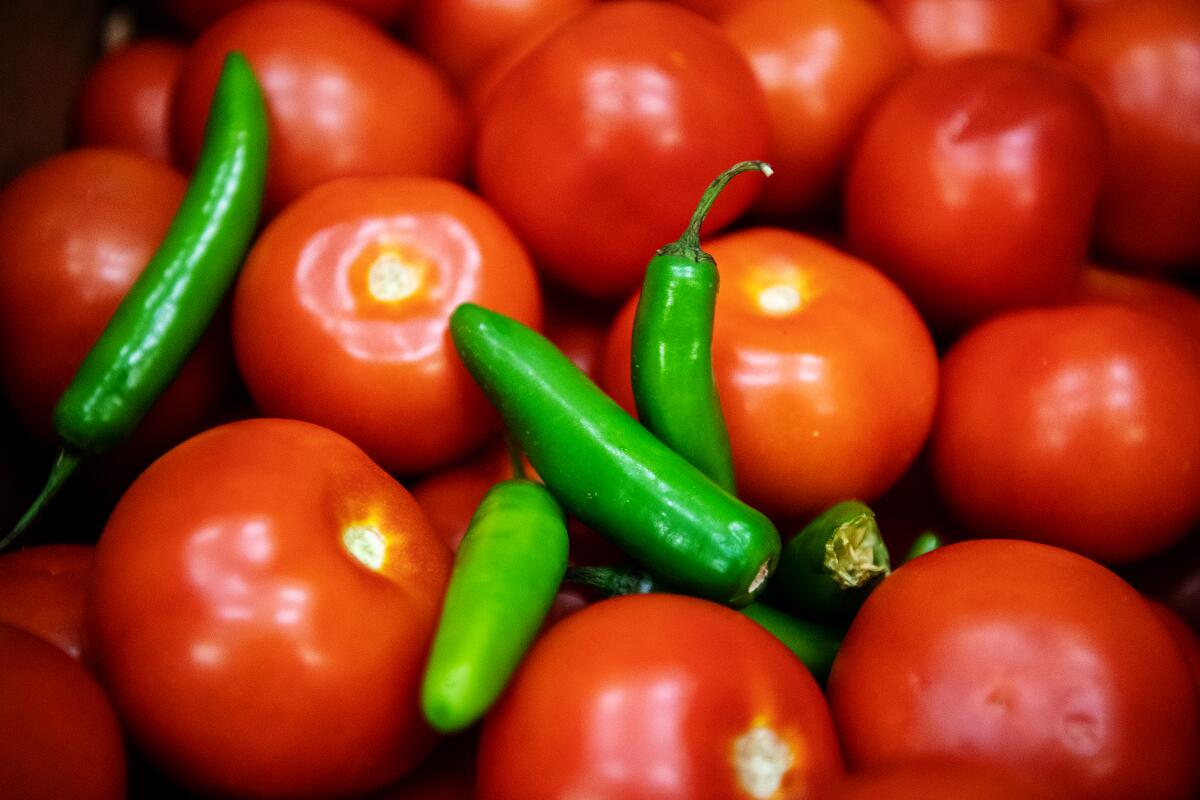
There are dozens of similar companies throughout California, but not all of them are willing to work with small-batch orders from cooks with big dreams.
Inquiries started to come in at the start of the pandemic as restaurants and catering companies and other businesses shut down, unemployment skyrocketed, and people were forced to look for new ways to support themselves. Some showed up at Village Green Foods with their favorite recipes.
“A lot of people have been sitting at home, stuck inside the four walls they live in,” said Willie Rosoff, who is 61. “They have said, ‘It’s time. Let’s go do that project.’”
Lucky Dog Hot Sauce is now in hundreds of stores across the country.
Every client pays an initial $3,000 deposit for 10 hours of research and development.
Then comes the taste test. Before the pandemic, clients were invited into the facility for a tasting, which could take hours. They liked to hang out, chat and suggest adjustments, Jenny Rosoff said. Now these sessions are done via Zoom or, if the client is able, in the Village Green parking lot, where samples are delivered as they sit in their vehicles. If the client believes their product isn’t ready, the research and development phase continues — as do the Rosoffs’ monthly charges for the service.
But if the initial development is judged a success, production can begin. The cost for production is separate from R&D and depends on the price of ingredients, packaging and volume.
The rest is up to the client. “Our job is to make the food accurately,” said Willie Rosoff. “Their job is to sell.”
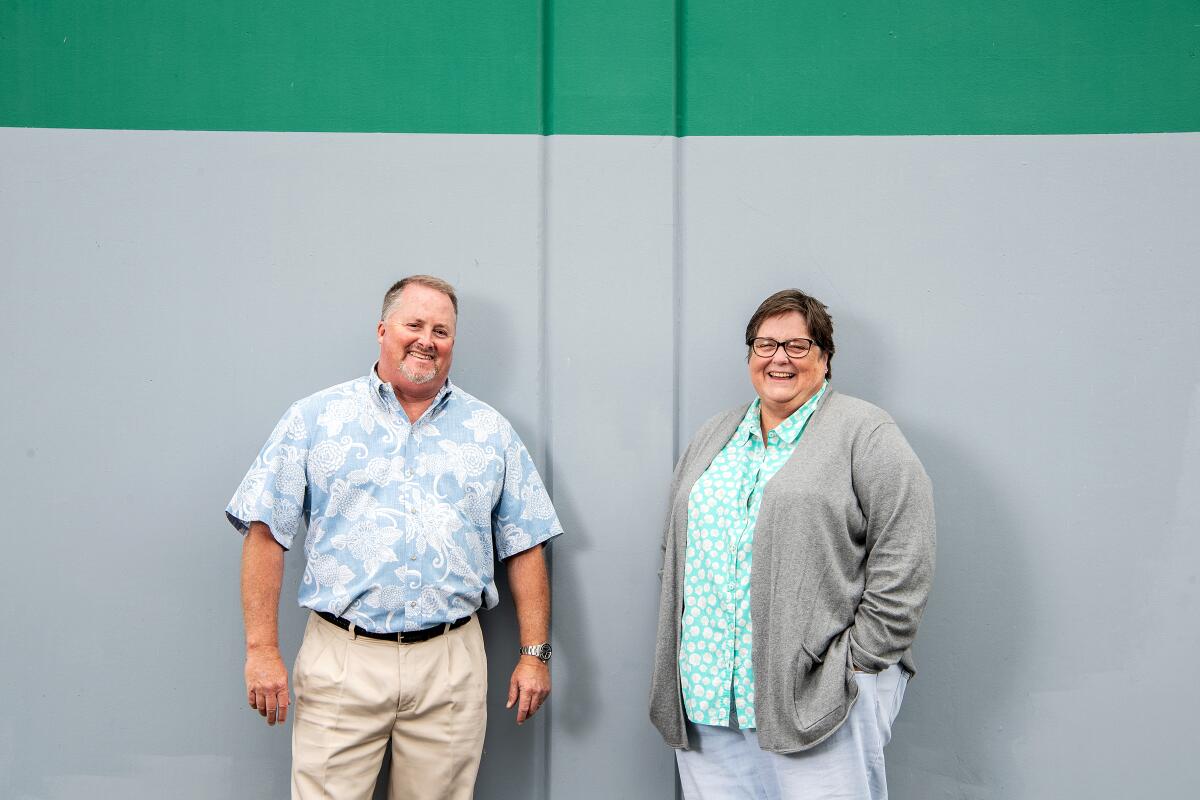
Most clients don’t achieve a level of success that would enable their side hustle in the kitchen to become their day job. Nonetheless, many cooks are eager to try. And once in a while a grocery store chain will take a chance on a new product.
Jenny Rosoff tries to be realistic with her clients. “This is not a high-profit industry,” she said. But some of her pandemic clients have managed to see some success in a relatively short period of time.
The possibility of success
David Strong’s day job came to a screeching halt last March. His menswear line, Monadic, had just launched when the pandemic hit, and retailers were forced to close for a time before entering a cycle of limited reopening and closing. Instead of hunkering down and waiting for things to reopen, Strong, based in San Clemente, took it as a sign to finally launch his side business, Strongarm Barbeque, a barbecue sauce company.
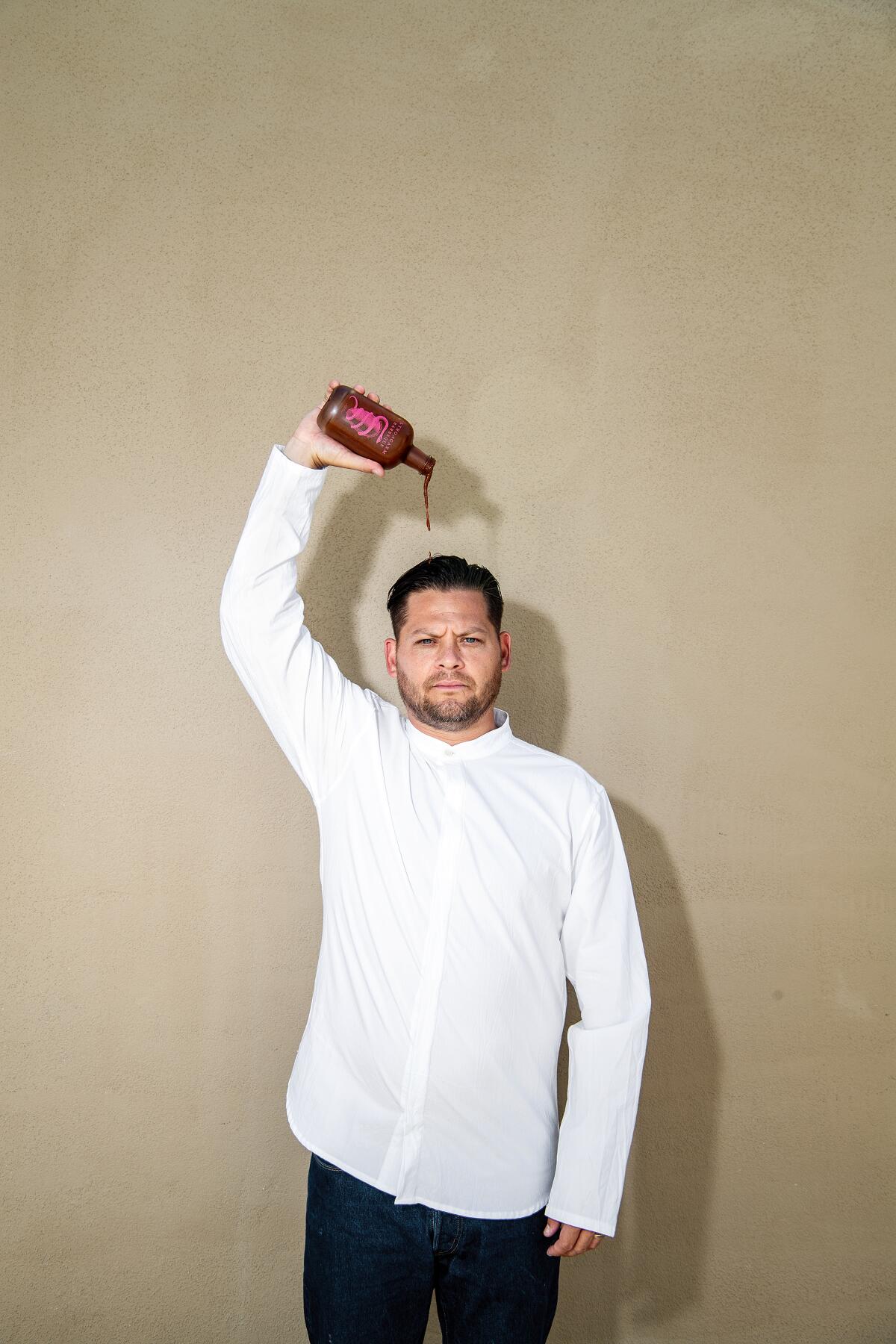
Strong christened his first sauce Subitism, a Buddhism term that roughly means “sudden awakening.” Because of his background in fashion, Strong also was engaged in the packaging, buying his glass bottles from a French wine and spirits glass bottle company, and the design of his label, which depicts a snake wrapped around the Orphic Egg, which in Greek mythology represents the beginning of the universe.
He was introduced to Jenny Rosoff through another Village Green Foods client, Clark Olson of Mago Hot Sauce. Although Strong’s French liquor bottles threw her off initially, Rosoff says she was won over by his product. They went through the research and development process and, after Strong approved the recipe, he put in an order for 155 bottles. “It sold out in a day,” Strong said, bought up by friends and contacts he’d made in the fashion industry.
He has been able to get his hot sauce in clothing stores and barbershops, in addition to traditional supermarkets. “All those components — beautiful sauce, beautiful bottle, engaging branding,” said Strong. “I just wanted to make something that was, you know, for lack of a better term, really beautiful.”
Strong now has a monthly standing order for 40 to 80 gallons of his sauce — 240 to 500 bottles — from Village Green Foods. And even though retail stores are open and his clothing business has picked back up, what was originally his side business gets equal attention. “They’re both my day job now,” he said.
And he’s close to launching a follow-up concoction, a buffalo sauce named Apeiron, a Greek word for boundless, or unlimited.
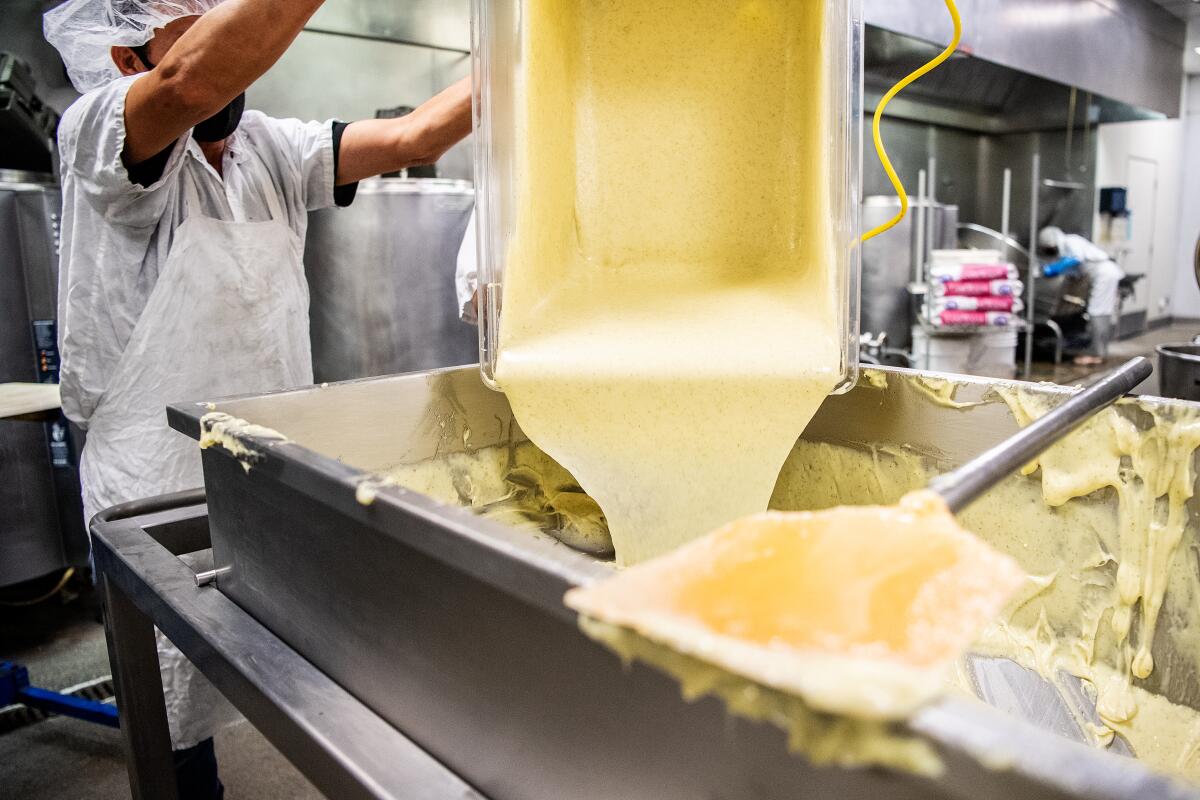
Village Green Foods, in the meantime, has struggled at times during the last several months. Willie Rosoff estimates that the restaurant side of their business has declined by about half since the pandemic began, and home cooking to order has not made up the difference.
“There were a handful of days where we just didn’t turn the lights on,” he said. But they’ve managed to maintain staffing, and as things have begun reopening, they’ve seen that portion of their business pick back up. “It’s impossible for us to be profitable at this point, but we’re very busy.”
His sister says she’s happy as long as she’s in her kitchen, tasting.
The siblings like to argue about who’s the better taster. “He has a better palate than I do,” Jenny Rosoff said of her brother, adding that he was the one they relied on if they had a particularly challenging hot sauce or chile oil.
Willie doesn’t completely agree with her. “I can decode probably faster than she can if you ask me to taste something,” he said. “I have a better chance of telling you what’s in it.”
But, he adds, “she has a better chance of figuring out how to cook it.”
More to Read
Eat your way across L.A.
Get our weekly Tasting Notes newsletter for reviews, news and more.
You may occasionally receive promotional content from the Los Angeles Times.
